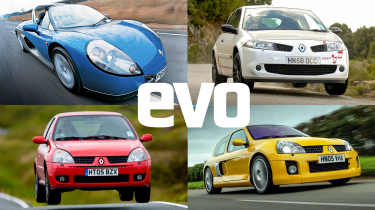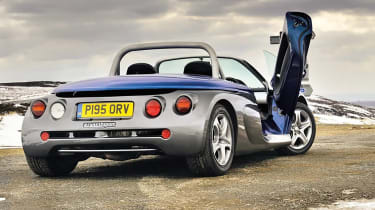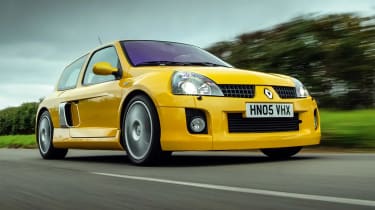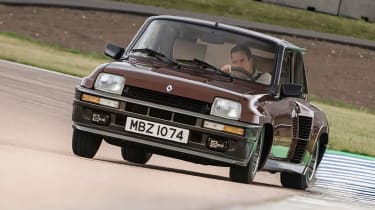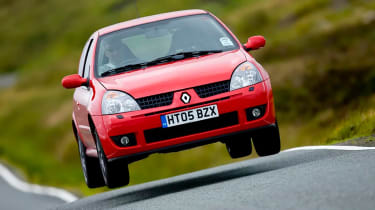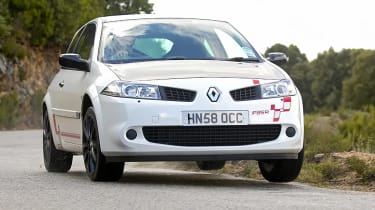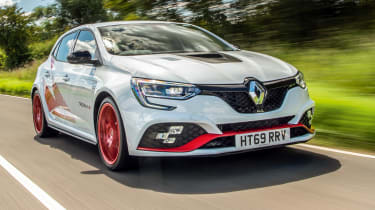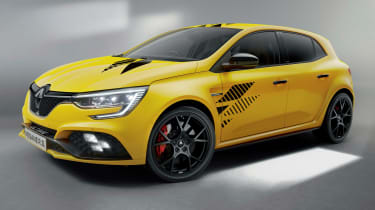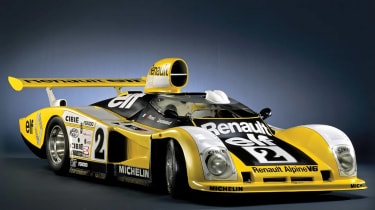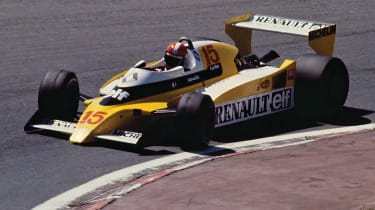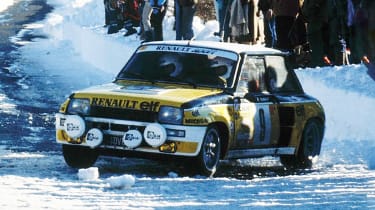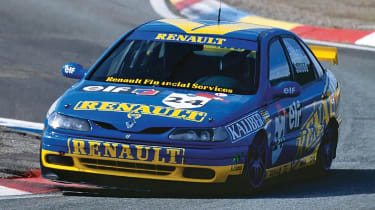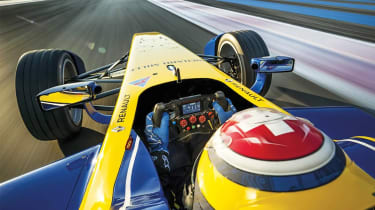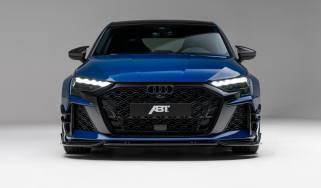Renault Sport’s greatest cars: road and track highlights from Renault’s performance stable
Best known for its world beating hot hatchbacks, we run down the history of Renault Sport and its finest creations
Founded in 1976, Renault Sport has since become a household name in the performance car world. The brand was born out of Renault’s takeover of Alpine’s competition department and went on to handle the French marque’s rallying and Grand Prix exploits.
Renault Sport officially met its end in 2021, with its engineers redirected to focus their efforts on Alpine and its future as a standalone performance car brand. Below we explore the remarkable history of the iconic Renault Sport name and some of its finest road and track creations.
> Renault Sport Clio: history of the french hot hatch hero from 172 to 220
Renault Sports’ greatest road cars
Renault Sport has put its name to some exceptional fast Renaults down the years and here’s our pick of the highlights…
Renault Sport Spider
Though the brand had been founded two decades before, it wasn’t until 1996 that the RS label was applied to a road car with the launch of the striking Renault Sport Spider. Unlike any road car Renault Sport produced in the years after, it was a true two-seat, open-topped sports car. Power came from a humble 148bhp mid-mounted 2-litre, four-cylinder powerplant cribbed from the Renault Clio Williams.
Figures are modest for 2023, but a kerb weight of just 930kg made for brisk performance. Our own Henry Catchpole suggested its unassisted steering and brakes ‘still offer more feel and honest interaction than those of most other cars in existence’, with the Spider itself serving up ‘the sort of immersive experience that so few cars dare to give you’.
Renault Clio V6
Renault Sport’s next extreme road car didn’t quite share the Spider’s levels of driver immersion, but it did share its engine location. The Clio V6 is every bit ‘the world’s smallest supercar’ - our cover line way back in issue 007. While the first-generation cars were built by TWR, development was down to Renault Sport.
Like the Spider, the Clio V6 was designed as much for the race track as it was the road, and a thriving race series accompanied the road car’s time in production. Both road and race cars were hindered somewhat in the usability stakes by a short wheelbase and lack of steering lock that – combined with that mid-mounted engine – made them particularly tricky on the limit.
When the Phase 2 was introduced (and built by Renault Sport itself in Dieppe) it improved the Clio not only in terms of power (the 3-litre Laguna-sourced V6 jumped from 227bhp to 252), but also friendliness.
Renault 5 Turbo
Homologated for Renault Sport’s rallying exploits, the Renault 5 Turbo is one of the firm’s greatest ever cars and even more thrilling to drive than the V6. Renault Sport’s engineers dropped their 1.4-litre turbocharged engine between the rear wheels and employed Bertone to pump up the bodywork to turn their shopping car into a stage-ready monster.
At its heart is the same 1.4-litre turbocharged four-cylinder as found in the earlier Renault 5 Alpine Turbo, but in this new rear-drive application it developed significantly more power. 160bhp and 163lb ft of torque to be precise.
In issue 231, Richard Meaden said: ‘By today’s standards the Turbo’s mechanical spec is rather feeble… a kerb weight of 900kg helps make the most of it, and in a funny sort of way the lag that leaves you becalmed below 4500rpm seems to intensify the rush you get when the boost gauge begins to twitch and you hear the engine fill its lungs.’
Renault Clio 182 Trophy
The 182 Trophy remains one of the greatest hot hatchbacks ever made, pairing trick remote-reservoir Sachs dampers with the faultless supermini formula of its more common siblings. Limited to just 525 units worldwide (500 for the UK), the Trophy was powered by the same naturally-aspirated F4R 2-litre four-cylinder as the 172 Cup and ordinary 182.
Visual changes are limited to Capsicum red paint, those Speedline Corse wheels, Trophy stickers and the roof spoiler from the Clio V6, but it’s those Sachs dampers that make all the difference.
Renault Megane R26.R
The on-paper specification alone marks the R26.R out as something special: a carbonfibre bonnet, plastic rear windows that flex to the touch, rear seats replaced by a red-painted roll cage and deep front seats with Sabelt-branded buckets.
Given that customers could also specify a light-weight and deeply unsociable titanium exhaust, the R26.R also has motorsport-style cred on its side. It’s the absorbing driving experience we valued the most, however, both when we tried it new and when the R26.R appeared in our ‘This is evo’ test in issue 200.
Renault Sport test driver Laurent Hurgon said: ‘For us, the R26R marked the beginning of a new era. Our brief was quite simply to turn the Mégane 2 R.S. into a competition car. So, we removed the rear seat, replaced the windows with plexiglass, and fitted a titanium exhaust, carbon bonnet, etc.’
Renault Megane RS Trophy-R
Launched as the marque’s most extreme road-going model, the Megane RS Trophy-R took track focus up a notch. Though built to the same formula as the R26.R, advancements in chassis tech and materials make it one of the most capable hot hatches ever built - and at over £70,000 with options, one of the most expensive too.
Output of 296bhp and 295lb ft of torque is identical to the standard car, but a 1306kg weight figure is where the Trophy -R pulls ahead. A host of carbonfibre components, optional carbon ceramic brakes and even carbonfibre wheels helped Renault Sport extract every last drop of performance from the platform, helping it regain the FWD production car lap record at the Nürburgring.
That setting that headline grabbing record wasn’t an easy task though, with Renault Sport test driver Laurent Hurgon adding: ‘In performance terms, the bar had been set very, very high and its development kept us on our toes. When I went for the record in it at the Nürburgring, it was the only time I had to resort to a second lap…’
Renault Megane Ultime
Launched as the final ever Renault Sport model, the Megane Ultime is limited to 1976 units (a reference to the brand’s founding year) and features a unique specification placing it between the Trophy and hardcore Trophy-R.
Combining the Cup chassis, the Trophy-R's four-piston Brembo brakes and the standard 296bhp 1.8-litre four-cylinder engine, it's set to be a formidable package. Lightweight 19-inch Fuji wheels, a semi-slick Bridgestone Potenza S007 track day tyre, unique decals and a revised seating position also help set it apart from the ordinary offering. Sadly though, we won't find out how it fares in a hurry, as it's not being sold in the UK…
Renault Sport's greatest motorsport moments
Renault is the only manufacturer to win top level races in five motorsport categories. Starting with the A442 at Le Mans, these are the cars that did it.
11th June 1978 - First sports car win
The iconic bubble canopy and tall airbox define the shape of the Renault-Alpine A442, but its victory at Le Mans in 1978 (in modified A442B form) secures its place in the history books. Renault won the event at the third attempt with Didier Pironi and Jean-Pierre Jaussaud holding off Wollek, Ickx and Barth’s Porsche 936 at an average speed of 130.6mph. It remains the firm’s only victory at Le Mans.
1st July 1979 - First Formula 1 win
Renault debuted its turbocharged RS01 at the British Grand Prix in 1977, but it was 1979 before Jean-Pierre Jabouille drove it to its first Formula 1 victory, fittingly at the French Grand Prix in Dijon. While the race is best remembered for a dramatic wheel-to-wheel tussle between Villeneuve and Arnoux for second position, JPJ’s win was the first victory of many for Renault and notably for Renault engines - as of 2016, 168 Grands Prix have been won with Renault power.
30th January 1981 - First WRC win
After nine hours, fifty-five minutes and fifty-five seconds of special stages, Jean Ragnotti crossed the line in the 1981 Monte Carlo Rally and gave Renault its first World Rally Championship victory. Renault had won rallies before of course (with the 8 Gordini and Renault-Alpine A110, among others), but the Renault 5 Turbo was the first since the WRC became an officially-sanctioned FIA series in 1973.
12th September 1993 - First BTCC win
Renault’s BTCC campaign became synonymous with the Laguna of the mid-1990s, but the brand’s first win actually came with the unloved Renault 19 16v. The driver was more familiar though: Swiss star Alain Menu, who subsequently took the BTCC title with Renault in 1997. A wet Donington Park allowed Menu to narrow the gap to faster rivals, securing a second-place finish in the first race of the day and Renault’s first win in race two.
13th December 2014 - First Formula E win
It’s little surprise Renault has become a dominant force in Formula E, as the French marque has led development of the all-electric single seaters since the formula’s inception. The e.dams Renault squad took the teams’ title in its first two seasons and e.dams driver Sébastien Buemi won the 2014-15 drivers’ championship. Buemi also gave Renault its first Formula E victory: He won round 3 of the inaugural season, at Punta del Este in Uruguay.
